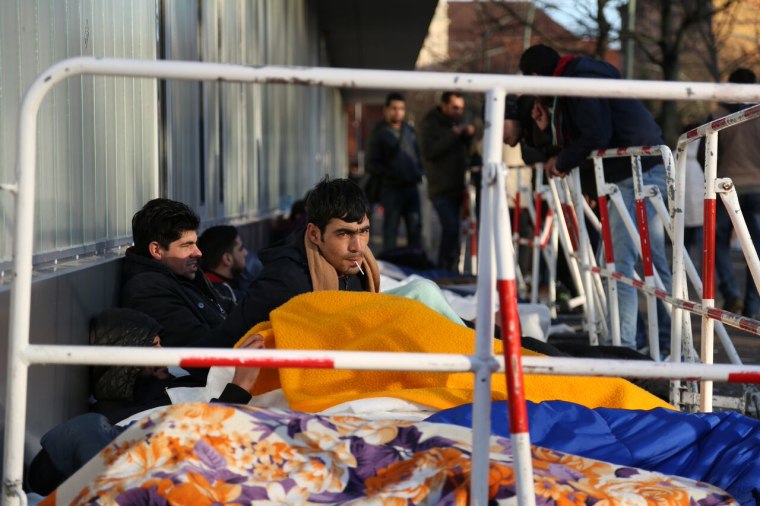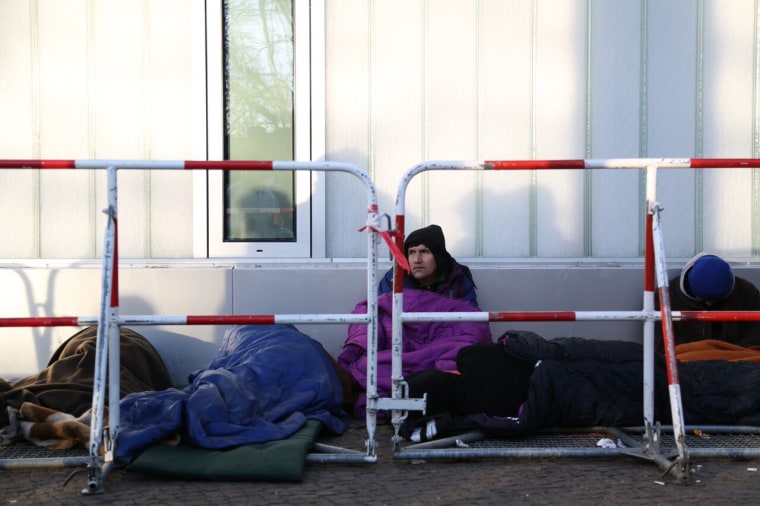BERLIN — Surrounded by hundreds of people huddled in sleeping bags on the sidewalk, Ibrahim Almoreed shivered in the December chill.
Several months after fleeing war-ravaged Syria with his father, the 16-year-old told NBC News he was happy to now be enjoying a "good life" as he waited outside Berlin's state office for health and social services. But life in Germany hasn't been easy for Almoreed — with the "very cold" winter weather just a small part of his struggles.
“I come here because I don’t take money for four months and there are too much people here, and problems, problems, problems,” Almoreed said. “I don’t have money to buy anything. I don’t have anything.”
The chaotic scene outside the office on a recent morning is an example of the challenges being faced after about 1 million asylum-seekers reached Germany during 2015. At times more than 10,000 refugees and migrants arrived daily in the country with a population of around 81 million.
Most of the newcomers arrived via the Balkan route after taking often-treacherous journeys on rubber boats from Turkey to Greek islands. Many were fleeing the war in Syria. Others left troubled countries like Afghanistan, Iraq and Somalia to seek better lives in the West.
In September, Germany announced it would spend around $6.6 billion to cope with the 800,000 migrants and refugees who at that point were expected to cross into the country by the end of 2015. Last week, the Die Welt newspaper reported that Germany's federal states were budgeting more than $18 billion to deal with the refugee crisis in 2016.
German authorities have re-purposed abandoned hardware stores and opened up school gymnasiums to house the asylum-seekers. They have even built tent cities, something that would have been unimaginable in the spring.
In Berlin, officials are struggling. After waiting in line for more than four hours, Almoreed said he was told they were unable to help him. “They tell to me, ‘Go, come tomorrow,’” he said. “I want help.”
Related: Why Museum Tours Are Giving Syrians Hope for the Future
Migrants said they’ve been waiting several weeks to register for welfare, and then have to return and wait again for any kind of assistance.
“There are too many people pushing and fighting and shouting,” Almoreed said. Still, his message to his mother and four siblings who remain in Syria is that life in Germany is good.
Abdul Samad, a 22-year-old Afghan national, cowered in his sleeping bag on a nearby sidewalk next to a busy street with buses rumbling by. He and dozens of other refugees leaned against a wall hoping to be at the front of the line the next morning when they would be let inside.

“I don’t have any money for food or clothes. We need it,” Samad said. “That’s why I’m in the front of the line.”
Samad said he left his home in Logar province, south of Kabul, because of the ongoing fighting there between government forces and the Taliban.
“Life is not good there,” he said. “Germany is good.”
Thousands of volunteers have pitched in and the government is hiring more police officers, as well as administrators to help deal with the backlog of asylum requests.
German Chancellor Angela Merkel has been clear.
“We can do this,” Merkel said again and again, even as members of her own party criticized her for not doing enough to protect the country’s border.
While other European leaders built fences along borders and ordered the use of force against migrants, Merkel’s unwavering stance of welcoming Syrians won international acclaim. Earlier this month, she was named TIME's Person of the Year.
Still, Merkel’s government has limited benefits for refugees and made clear that not all would receive asylum. The interior minister, for example, said that most Afghans would be sent back.
There has also been a backlash against refugees with an increase of arson attacks on refugee shelters and violence by right-wing extremists.
Right-wing parties such as the Alternative for Germany have gained support, in some polls getting about 10 percent, as they have been able to capitalize on the fears of how the arrival of refugees might impact German society.
Gallery: Refugee Family Starts New Life in Germany
Party leaders have marched at protests with banners such as “Asylum needs limits" and questioned the ability of newcomers to integrate, warning of a parallel culture.
But overall, Germans are split over the question of whether the country can handle the influx of refugees. In a recent poll by public broadcaster ZDF, 51 percent said it could, but 46 percent did not believe so.
Many Germans also see an opportunity with the high number of new arrivals for a society that is aging rapidly.
Maja Hebel, the founder of the Hotel Utopia project, said that most have shown high potential and are motivated.
The non-profit organization aims to open a hotel in central Berlin in 2017 that will be primarily run by refugees. Instead of being guests, the refugees would take care of guests.
"That puts them into the middle of society,” Hebel said, adding that she hopes this would reduce some of barriers encountered when Germans and refugees try to meet.
The project is designed to quickly bring refugees into the workforce and help them integrate in society overall.
Related: Here's How to Make Money Off the Migrant Crisis
“We quickly decided that the hotel industry is a perfect match because it’s very international," Hebel said. "It offers quite a few different job opportunities for highly qualified people but also for people who have little previous experience."
Hebel said she hopes that once the project is up and running it could be an example for the private sector and help to tackle potential fears of employers.
